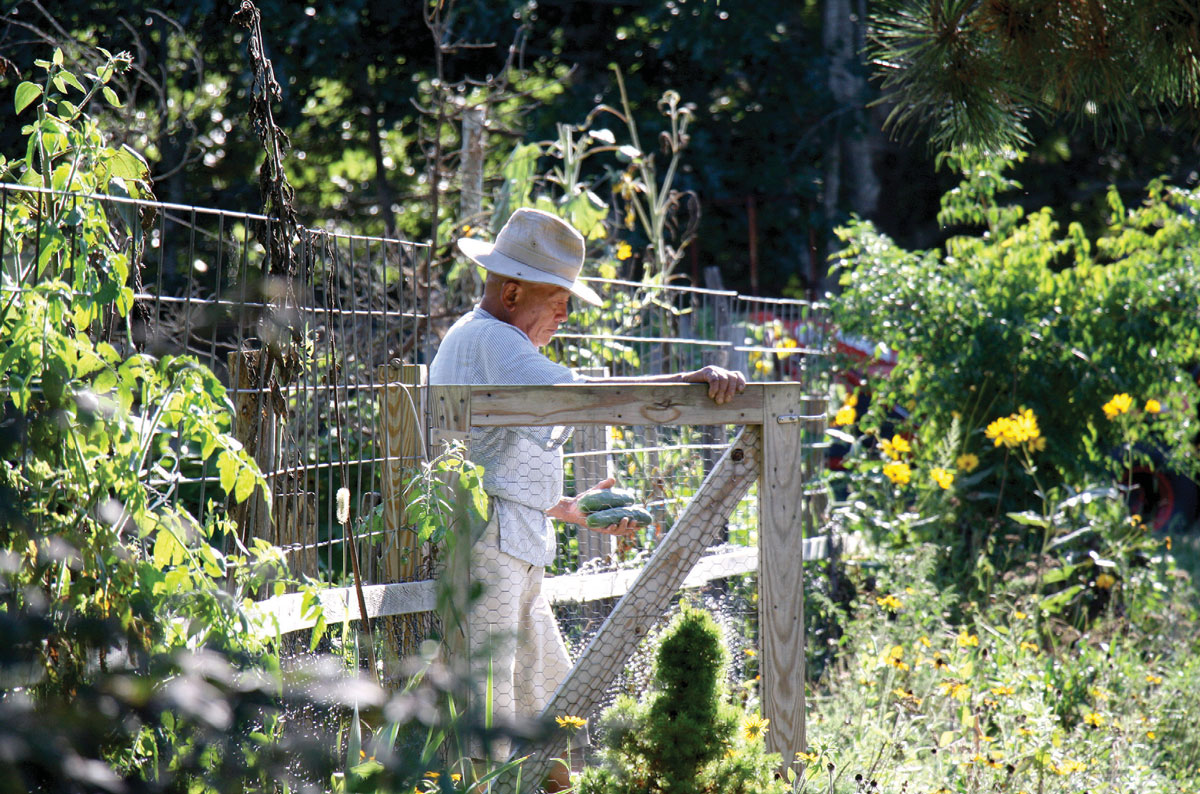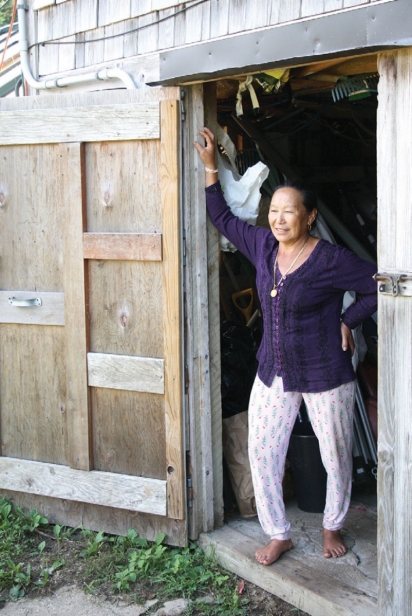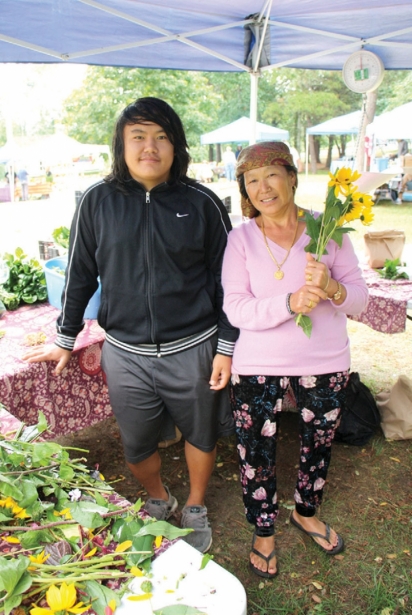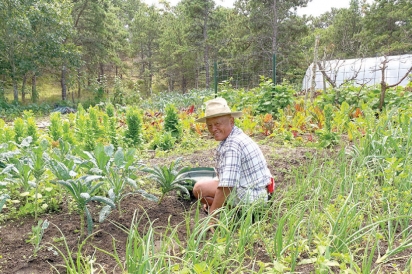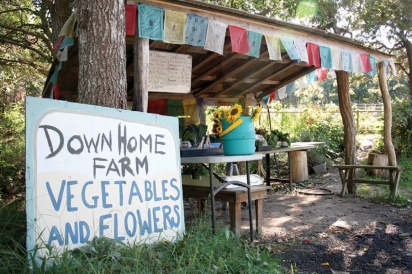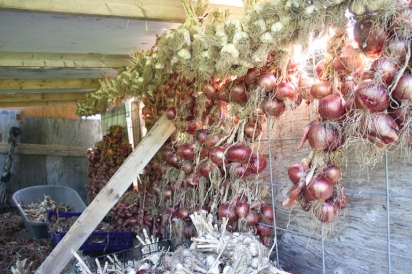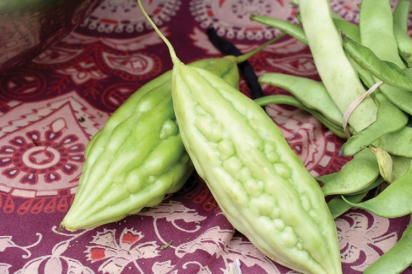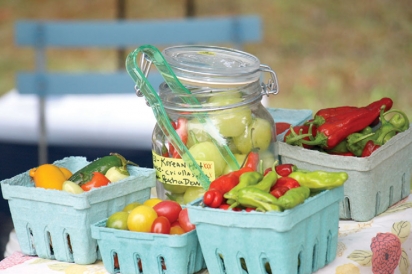Down Home Farm is a Truro Treasure
A small wooden farmstand, festooned with colorful flags, sits at the end of Truro Center Road just before the entrance to Route 6. Plastic bins filled with fresh greens, herbs, tomatoes, alliums, root vegetables and more populate a wooden picnic table. Taller buckets and glass vases spill over with vibrant bunches of flowers – peonies, dahlias, hydrangeas, sunflowers – grouped in colorful arrangements. A hand-written sign hanging from the roof lists prices, and customers leave money in a cash box on the table. Frequently at least one of the farmers, Digree or Bhala Rai, is busy in the adjacent garden. It is not unusual for Digree to send a customer away with a gift – an extra head of kale, a couple of eggs from their chickens or a few more flowers to fill out an already bursting bunch.
The Rais are a fixture in the neighborhood as well as at the Truro, Provincetown and Wellfleet farmers’ markets. Their produce also appears on menus at Ceraldi in Wellfleet and Blackfish in Truro, and the flowers enhance the dining room at Sal’s Place in Provincetown. Salty Market Farmstand in Truro also sells their flowers and greens.
Bhala Rai first came to Truro from his native Nepal in 2006, when local resident Nancy Pease asked him to help out around her house, doing odd jobs and yard work. They had become friends when Rai worked as Pease’s porter and guide on her multiple treks in the Himalayas. For five years he spent three to four months in Truro and returned to Nepal for the rest of the year.
By 2011, Bhala had received a green card and was able to bring his wife and their then 10-year-old son, David, to live with him in Truro year-round. They left behind an older son and daughter. Digree, who spoke no English when they arrived, admits that at first, “I was a little bit confused. I didn’t understand everything.” David, who had attended an English-speaking school in Kathmandu, says the transition from a big city to a small rural town was “interesting. It was very different because we lived in the city and we came here, and it was like a village.” But he says both the community and Truro Elementary School, which he attended when he first arrived, helped ease the transition.
By the time his family arrived, Bhala had been doing landscaping and other work for some of Pease’s neighbors, including Ron Singer and his wife Janice Allee. Allee converted a renovated barn on their property into a home for the family, hired the Rais to work for them year-round doing landscaping, and allowed them to farm a small hillside plot on the property. The Rais say that Allee, who passed away in 2017, was instrumental in helping them build their current business, as was Sustainable CAPE founding director Francie Randolph.
Randolph, who also lives in their neighborhood, first met Digree and Bhala when the parents all watched their sons play baseball together. She says she was struck by the “absolutely gorgeous” flowers they were growing on Singer and Allee’s land. Thinking they could probably grow vegetables equally successfully, and knowing that Singer and Allee were open to agricultural use of their land, she approached them about it. At the time, Sustainable CAPE was in the process of launching the Truro Farmers’ Market (the organization now manages the Provincetown market as well). Randolph’s hunch paid off. The Rais have become a cornerstone of the Truro market. Initially, Allee helped teach the family what to grow that locals and vacationing shoppers would want to buy. Over time, “We picked up on what people liked most,” says David, a student at Cape Cod Community College. In the summers, he works with his mother at the farmers’ markets.
Randolph worked with Sustainable CAPE’s landlord to allow the Rais to erect their small farmstand at the edge of the parking lot where the organization’s office sits, and to use some land behind the building to farm. That garden grows a little bit each year.
Digree says their greens – particularly kale and arugula – are big sellers, along with tomatoes, onions, garlic and carrots. “I grow so many onions and garlic all summer,” she says. As the season progresses, bins at the markets overflow with summer squash in various colors along with eggplants, peppers, scallions and herbs.
In the summer there are usually long lines at Down Home Farm’s farmers’ market stalls. Digree’s flowers, which she arranges in big, beautiful bunches, are particularly noteworthy. “That’s her specialty,” says David. “My job,” she adds, beaming. “I love any kind of flowers.”
On a sunny morning in early spring, Digree takes me to the sloping terraced garden just below their cottage. She explains that she and Bhala dug up all the grass themselves, using shovels and trowels. Then Bhala created terraces using a neighbor’s tractor. Asked today how much land they farm, Bhala laughs. “I have no idea,” he says. Between the plot on Singer’s property and the garden next to the farmstand – which is just down the road – David estimates it is about two acres. They also have two greenhouses, one by their cottage and another by the farmstand.
In March, the farmers start seeds for their annual crops in the greenhouses. In early spring the smaller of the two contains row upon row of small containers holding tiny sprouts of lettuce, herbs and multiple varieties of tomatoes. Once the temperatures are consistently warm enough, the farmers transplant everything outside.
Digree and Bhala take turns visiting their children and four grandchildren in Nepal during the winter whenever they can. So far, their native country’s laws have made it difficult for the family to leave the country to come to Truro, even for a visit. On her most recent trip in January through March, Digree not only was able to spend time with her family but could enjoy some of the ingredients she has trouble finding in the U.S. “I eat so much hot pepper,” she says with a grin.
But Truro is home now. They have come a long way. “They are a big influence on the community,” says Randolph.
Andrea Pyenson has been a food writer and editor for more than 20 years, contributing to publications including The Boston Globe, Edible Boston, The Washington Post and Fine Cooking. She was co-author of three cookbooks with chef Andy Husbands and his barbecue teammate, Chris Hart, and helped edit The Boston Globe’s New England Seafood Cookbook. Andrea has been a judge with The Readable Feast New England culinary book festival, now in its eighth year, since its founding. She divides her time between Truro and Newton.
Down Home Farm Farmstand
8 Truro Center Road, Truro
Down Home Farm can be found at the Truro, Wellfleet and Provincetown farmers’ markets (for more info on each, consult 2023 Farmers’ Markets list in this issue).


